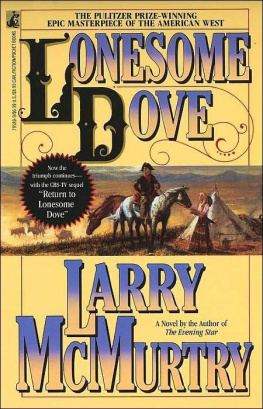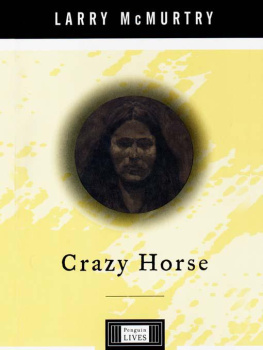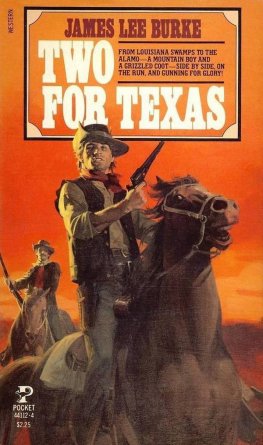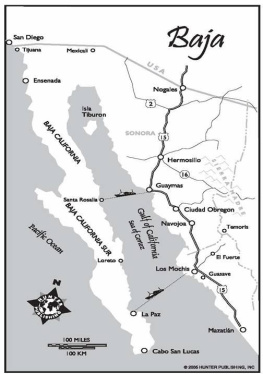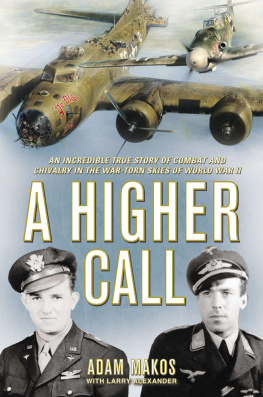
STREETS OF LAREDO
by Larry McMurtry
Part I A Salaried Man
"Most train robbers ain't smart, which is a lucky thing for the railroads," Call said.
"Five smart train robbers could bust every railroad in this country." "This young Mexican is smart," Brookshire said, but before he could elaborate, the wind lifted his hat right off his head. He was forced to chase it--not the first time he had been forced to chase his hat since arriving in Amarillo. He had taken to ramming his hat down on his head nearly to his eyebrows, but the Texas winds were of a different order than the winds he had been accustomed to in Brooklyn, where he lived. Somehow, time after time, the Texas winds lifted his hat. Before he could even get a hand up to grab it, there it went.
It was just a common fedora; but on the other hand, it was his only hat, and it was not his custom to go through life bareheaded, at least not while he was conducting business for the railroad. Colonel Terry would not have approved. Brookshire was only a salaried man, and he could not afford to ignore Colonel Terry's preferences in such matters.
This time the hat rode the wind like a fat bird --it had a twenty-yard lead on its owner before it hit the ground, and when it did hit, it rolled rapidly along the gritty street.
Fortunately for Brookshire, a wagon was parked to the south of the station, and the hat eventually lodged against one of the wagon wheels. He strolled over and picked it up, trying to appear nonchalant, though in fact, he was more than a little out of sorts.
At the behest of his superiors--Colonel Terry in particular; Colonel Terry, the president of the railroad, was the only superior who counted--Brookshire had journeyed all the way from New York to hire a bandit killer.
Brookshire was an accountant. Hiring bandit killers wasn't his line of work, but the man who normally handled the task, Big Johnny Roberts, had accidentally swallowed a wine cork and choked to death, just as he was about to depart for Texas. From Colonel Terry's point of view, it was a nuisance; he took a look around the office and before Brookshire knew it, he was on a train going west, in Johnny Roberts's stead. In his years with the railroad, he had performed a number of services, but never in a place where his hat blew off every time he turned a corner. Having to chase his hat was an aggravation, but the real reason he was out of sorts was because he wasn't at all impressed with the killer he had been instructed to hire.
About the best thing Brookshire could find to say for the small, weary-looking man standing in front of the little shack of a depot, a saddle and a duffle roll stacked beside him, was that he had been punctual. He had ridden in at dawn, hitching his sorrel mare outside the hotel precisely at seven a.m., the time agreed upon. Still, Brookshire had barely been able to conceal his shock when he saw how old the man was. Of course, Brookshire was aware of his reputation: no one in the West had a reputation to equal Woodrow Call's. In Brookshire's view, reputation did not catch bandits--at least it didn't catch bandits who covered country as rapidly as young Joey Garza. The young Mexican was said to be only nineteen years old, whereas Captain Call, from the look of him, was edging seventy.
Nonetheless, Brookshire had been ordered to hire Woodrow Call and no one else. More than that, he had been entrusted with a fancy, engraved Colt revolver which Colonel Terry had sent along as a special gift.
To Brookshire's dismay, Captain Call scarcely glanced at the gun. He didn't even bother to lift it out of its rosewood box. He didn't twirl the chamber or admire the fine engraving.
"Thanks, but I'll pass," he said. He seemed more grateful for the coffee. Of course, it was wintry, and the old Ranger was only wearing a light coat.
"Good Lord, what will I tell Colonel Terry?" Brookshire asked. "This gun probably cost him five hundred dollars. This engraving is handwork. It don't come cheap." "Why, the Colonel can keep it himself, then," Call said. "I appreciate the thought, but I've no place to keep a fancy weapon.
I'd have to deposit it in a bank, and I prefer to avoid banks.
"I generally depend on the rifle, not the pistol," he added. "If you're close enough to a killer to be in reach of a pistol bullet, then generally you're too close." "Good Lord," Brookshire said, again. He knew Colonel Terry well enough to know that he wasn't going to be pleased when told that his gift had not been wanted. Colonel Terry hadn't been a colonel for nothing, either. Having such an expensive present rejected by a fellow who just looked like an old cowpoke would undoubtedly put him in a temper, in which case Brookshire and anyone else who happened to be in the office would have to scramble to keep their jobs.
Call saw that the man was upset--he supposed, really, that he ought to accept the gun.
That would be the polite thing. But in the past few years, governors and presidents of railroads and senators and rich men were always offering him fancy weapons, or expensive saddles, or the use of their railroad cars, or even fine horses--and always, something in him resisted.
For one thing, he despised fancy gear. He rode a plain saddle, and all that he required in a weapon was that it be reliable and accurate.
For another thing, he had never met a governor or a president of a railroad or a senator or a rich man that he liked or felt comfortable with. Why place himself in some arrogant fool's debt for the sake of a gun he'd never shoot nor probably even load?
Only a few days before, Call and Charles Goodnight had discussed the matter of gifts from the rich and powerful. It had been the day, in fact, that Goodnight had ridden out to the little line cabin he let Call use when he was between jobs, and handed Call the telegram asking him to meet a Mr. Ned Brookshire in Amarillo at seven a.m., in the lobby of the best hotel.
Goodnight himself was famous; probably as famous as a cattleman could get. He had also been offered twenty-five or thirty engraved Winchesters in recent years, but, like Call, he was skeptical of the rich and powerful and seldom felt comfortable in their company.
Throughout most of their lives, which had only occasionally intersected, Woodrow Call and Charles Goodnight had not exactly gotten along. Somehow in the old days, the Indian-fighting days, they had rubbed one another the wrong way almost every time they met. Even now, they did not exactly consider themselves friends. Once a week or so, when Goodnight was around his home ranch, he had formed the habit of riding out to the little line cabin to check on his guest, the famous Texas Ranger.
The shack sat not far from the north rim of the Palo Duro Canyon. Often the two men would sit, largely in silence, looking down into the canyon until dusk and then darkness filled it.
In the dusk and shadows they saw their history; in the fading afterlight they saw the fallen: the Rangers, the Indians, the cowboys.
"Let a man give you a fancy gun and he'll tell everybody in five counties that he's your friend, when in fact, you may despise him," Goodnight said, spitting. "I don't number too many rich fools among my friends--how about you?" "I have not had a friend for several years," Call said. Only after he said it did it occur to him that the remark might sound a little odd--as if he were asking for sympathy.
"Of course, there's Pea and there's Bol," he added, hastily. "Bol's out of his head, but I count him a friend." "Oh, your cook, I think he fed me once," Goodnight said. "If he's out of his head, how do you keep up with him?" "I left him with a family in San Antonio," Call said. "When I get a job down near the border I sometimes put him on his mule and take him with me. There's another family in Nuevo Laredo I can board him with when it comes time to do the work.
Next page

